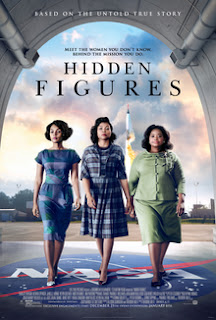
Written by: Allison Schroeder & Theodore Melfi
Starring: Taraji P. Henson, Octavia Spencer, Janelle Monáe, Kevin Costner, Kirsten Dunst
Rating: [4/5]
History, as straightforward as it should be, does not always include important details, if not the ancillary ones as well. Unfortunately, this leaves individuals from marginalized identities out of the loop on most occasions as highlighted in Hidden Figures. Shining a light on three women fundamental to this country’s success in the space race even when hindered with the shackles of racism and misogyny trying to hold them back.
In the midst of the space race against the Soviet Union, three African-American women, Katherine (Taraji P. Henson), Mary (Janelle Monáe), and Dorothy (Octavia Spencer) try their best to succeed in their respective areas. Each of them faces their own challenges in their own area as they begin to highlight the discrepancies in how they get treated.
Mild but lovely in its storytelling, Hidden Figures serves as a good history lesson about those who do not receive the credit they deserve for their contributions. When thinking of our exploration to the moon, the first individuals the average person thinks of are Neil Armstrong and Buzz Aldrin as the astronauts who stepped on the moon. Their words are etched into history, but the folks behind the scenes had plenty to do with the accomplishment. If the white men involved behind the scenes did not get enough credit, individuals like the three women highlighted in this film have even less of an opportunity. The simple act of highlighting the women serves as its own accomplishment even if the pedestrian filmmaking does not entirely stand out.
The highs of the film come in the moments of accomplishment by these women, especially when it embarrasses the racists they have to work with on a daily basis. Every single one of these instances brings gratification from the simple pleasure of these women proving long-held racial beliefs very wrong. This also gets paired with the aggravating scenes where they have to encounter overtly racist actions by co-workers, who are meant to be the smartest individuals the country has to offer. Even the brightest minds in this time had no issue viewing themselves as superior to these Black women. From the simplicity of having a bathroom relatively near them, the discrimination these women face boils the blood but succeeds in what it wants to accomplish not just in the workplace but also in the misogyny they face at home.
On the other hand, this film comes with plenty of “white savior” moments that do cause the eye to roll. Moments that feel a bit over the top for the purposes, once again, to make other white individuals proclaim they would have certainly been that person as opposed to the other racists in the room. The one with knocking down the bathroom sign turns it up to 100 to an unearned degree. It makes sense with the character but it comes so far out of left field for it not to have the desired effect.
As pleasant as the filmmaking is within this feature, there is a distinct pressure from both racing against the Soviets and the battle with innovation. With each new advancement by the Soviets, it revs up the pressure on everyone else as plenty of money is being spent by the American people and they do not want to finish in second place. Additionally, prior to branching out into their own areas, these women served as human computers, who are essentially brought in to do calculations for the other professionals. A profession that no longer exists with the advent of other technology and this film deftly works through how that endangers these women and in what ways they need to adapt in order to remain indispensable in their positions. Certainly something several professions face every year as we continue to advance in a technological sense.
The heart and soul of this feature rest with the cast and they definitely came to play to elevate the entire production. Taraji P. Henson receives the most screen time and chews it all up in a great way in order to display the struggles and victories of this woman. Both at work and in her personal life, Katherine has plenty of transition and the strength emanating from Henson’s performance just lifts everything else around her. The same goes for Spencer and Monáe as their characters go through their own struggles. In addition to the three leads, other supporting players round out a very impressive cast list with smaller roles given to Aldis Hodge, Mahershala Ali, Glen Powell, Kirsten Dunst, and Kevin Costner. All serving their purpose in telling the complete picture of these women’s lives and doing it quite well.
Nothing groundbreaking through its storytelling but rather in the information being disseminated within the narrative. It highlights the discrimination these women had to face in all facets of their life and how much they needed to overcome in order to even be viewed as equals. Fairly straightforward lacking any extraordinary facets to its style but it serves its purpose and allows these women to thrive, which I will always love to see.

